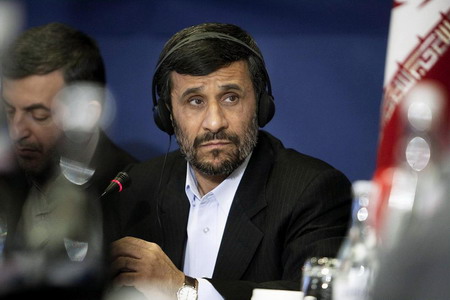
Iranian President Mahmoud Ahmadinejad answers questions during a meeting at his hotel in Copenhagen December 18, 2009, on the sidelines of the U.N. climate change summit.
|
 Iranian President Mahmoud Ahmadinejad answers questions during a meeting at his hotel in Copenhagen December 18, 2009, on the sidelines of the U.N. climate change summit. |
WASHINGTON: December is "a very real deadline" for Iran to "pursue its responsibilities" on the nuclear issue, White House spokesman Robert Gibbs said Tuesday.
Responding to Iranian President Mahmoud Ahmadinejad's defiance over a year-end deadline to accept a uranium-swap deal, Gibbs said while Ahmadinejad "may not recognize ...the deadline that looms, but that is a very real deadline for the international community."
Ahmadinejad appeared on TV earlier in the day, dismissing the US backed deadline for Iran to accept a deal for swapping enriched uranium with nuclear fuel.
"The problem is that the US seeks to dominate the Middle East but the Iranian nation is an obstacle," and issues such as Iran's nuclear program were nothing but "pretexts," he said.
The United States and its Western allies have been accusing Iran of secretly developing nuclear weapons under the disguise of civilian nuclear power. Iran has denied the accusation and stressed its nuclear program is only for peaceful purposes.
Under a draft deal brokered by UN nuclear watchdog International Atomic Energy Agency (IAEA), most of Iran's existing low-grade enriched uranium would be shipped to Russia and France by the end of the year, where it would be processed into fuel rods with the purity of 20 percent.
The higher-level enriched uranium would be transported back to Iran to be used in the research reactor in Tehran for the manufacture of medical radioisotopes.
Iran has rejected the deal, demanding a simultaneous exchange between low and higher level enriched uranium inside the country.
The United States has threatened another round of UN sanctions against Iran if it doesn't abide by the year-end deadline.
"We've begun to take steps, if Iran is unwilling to pursue its responsibilities," Gibbs warned.
As Iran and the United States mired in a war of words, the State Department said Tuesday the five permanent members of the UN Security Council and Germany had a teleconference session earlier in the day to assess developments related to the Iranian nuclear program.
Department Spokesman P.J. Crowley said Undersecretary of State for Policy Bill Burns talked with his P5+1 counterparts about " future steps." According to the spokesman, political directors from foreign ministries of Russia, Britain, France, China, and Germany participated in the session.
In the White House briefing, press secretary Gibbs said "we have offered them a different path. If they decide not to take it, then our delegation, with the P-5-plus-1, will move accordingly."
Crowley said Iran must either answer questions "about its nuclear aspirations or face additional pressure," and the United States will be consulting with other sides in the coming days and weeks.
"Come 2010 should Iran continue in its current posture that there will be implications and consequences for their failure to take advantage of this opportunity," he said.